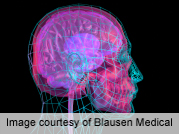
TUESDAY, Feb. 14 (HealthDay News) — Using brain scans, researchers were able to monitor mental decline over a two-year period in people without dementia and even predict the disorder before it happened, according to a new report.
Scientists may one day be able to use brain scans to track the effectiveness of medications designed to treat Alzheimer’s disease. This brain-robbing disorder currently has no cure, and its progression cannot be halted by medication either.
The scans can detect a chemical marker developed by the researchers that binds to plaques — a kind of brain gunk — and “tangles,” which are both linked to Alzheimer’s disease. The investigators tested the effectiveness of the method on 43 healthy study participants, whose average age was 64. Nearly half of the volunteers had a form of memory loss called “mild cognitive impairment.”
The study findings are published in the February issue of the Archives of Neurology.
“We are finding that this may be a useful neuroimaging marker that can detect changes early, before symptoms appear, and it may be helpful in tracking changes in the brain over time,” study author Dr. Gary Small, a professor of psychiatry at the Semel Institute for Neuroscience and Human Behavior at the University of California, Los Angeles, said in a university news release.
The researchers found that they were able to link scan results to mental decline after two years, and were even able to use findings from the initial scans to predict some kinds of brain decline in the participants two years later.
The next step is to use the scans to study the effectiveness of medications designed to treat brain aging, and therapies used to try to delay or prevent Alzheimer’s disease, Small explained in the news release.
In response to the question of whether the scans could be useful for patients right now, Catherine Roe, a research assistant professor of neurology and Alzheimer’s specialist at Washington University in St. Louis, who was not involved with the study, pointed out that doctors have other ways to detect mental decline, and there’s still no preventive treatment for Alzheimer’s disease.
Yet, “although I don’t think this technology is ready to be applied in doctors’ offices right now, I think it would be useful clinically in helping to determine what the underlying cause of the [mental] decline is, whether it’s Alzheimer’s or something else,” Roe said.
More information
For more about Alzheimer’s disease, visit the U.S. National Library of Medicine.

